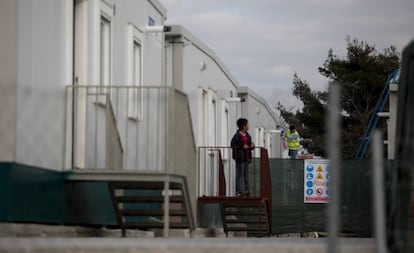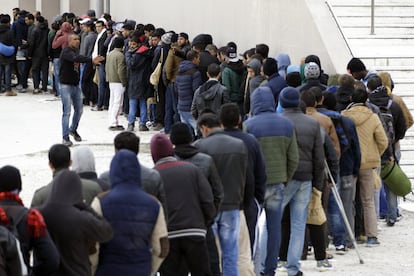Spain to introduce tougher asylum requirements
The Interior Ministry is planning more restrictions in order to adapt to European Union directives

The Spanish government is drafting a new law that will restrict the right to asylum, following the path taken by the European Union in recent years.
A draft of the bill, to which EL PAÍS has had access, limits access to asylum application at migrant holding centers, and expands the list of legitimate reasons for denial.
The issue could be a cause of friction within Spain’s new coalition government, made up of the Socialist Party (PSOE) and the leftist Unidas Podemos. A spokesperson for the Interior Ministry declined to comment on the plans.
The key lies in having a quick system for differentiating between people who have the possibility of requesting asylum and those who do notEU official
The current legislation, which dates back to 2009, is viewed as obsolete because migration patterns have changed enormously since then. While Spain once processed very few asylum applications, last year it had 118,000 requests. This makes Spain the third recipient of potential refugees in the EU, not far behind France and Germany.
The new rules are being drafted in response to several ultimatums from Brussels. Spain has been delaying the adaptation of its legislation to EU directives, and it has used up all its available time for doing so. The European Commission has warned Madrid repeatedly, most recently in October 2019, that failure to adopt European guidelines could land Spain before the EU Court of Justice.
The government, which was formed in January of this year following the repeat election of November 2019, is now working to adapt to EU rules, and the new legislation will also include a few initiatives of its own. The final version will depend on the outcome of negotiations between various actors, including the ministries of social security and migrations and foreign affairs.

The draft bill reflects the EU’s more restrictive immigration policy that resulted from the 2015 migrant crisis, when more than one million refugees arrived in Greece and Italy. It was then that Brussels decided to get more restrictive with so-called economic migrants, those whose safety is not in danger back home and who are not entitled to international protection.
Europe’s plans include accelerating and increasing deportation of economic migrants, securing the borders, and forcing EU member states to accept a fairer relocation system where everyone shares responsibility for asylum seekers, not just the frontline countries.
“The key lies in having a quick system for differentiating between people who have the possibility of requesting asylum and those who do not,” said a high-ranking EU official. “Those who are not refugees must be sent back.”
Stricter deadlines
Spain is considering setting a deadline for filing asylum applications. EU legislation establishes a period of 30 days, but this is not currently contemplated by Spanish law. The deadline will be even stricter for foreign nationals at holding centers (CIE). The Spanish Interior Ministry has proposed giving these migrants up to 10 days to file their application after being informed of their right to do so. Police sources have repeatedly noted that migrants often file for asylum simply as a way to postpone deportation. In 2019 there were 2,164 applications filed by CIE interns, representing 2% of all requests that year.
Adapting to EU directives will also mean expanding the legitimate reasons for denying asylum
Adapting to EU directives will also mean expanding the legitimate reasons for denying asylum. One reason is whether there are any safe areas in the applicant’s country of origin where he or she could settle down. The draft bill defines what constitutes a safe country according to EU guidelines. Although each application must be reviewed individually, this change of criteria means that if the asylum seeker comes from a country considered safe by Spain – say, Morocco – the application could be turned down.
The same criteria would apply if the asylum seeker regularly resides in a third country deemed safe. Reviewers will also assess “whether there are any ties between the person and a third country that would make it reasonable for him or her to be sent there.”
The Interior Ministry is also considering eliminating a cross-ministerial committee that currently makes decisions on asylum requests, because this step “slows down the process tremendously.” The Office of Asylum and Refugees currently has more than 120,000 requests pending processing, even though it is reviewing cases five times faster than it used to.
Not all new measures involve tougher conditions. The draft legislation also introduces greater legal security for asylum seekers by recognizing them as such from the moment they express a desire to file for protection. This was already happening in practice, but will be now established by law.
English version by Susana Urra.
Tu suscripción se está usando en otro dispositivo
¿Quieres añadir otro usuario a tu suscripción?
Si continúas leyendo en este dispositivo, no se podrá leer en el otro.
FlechaTu suscripción se está usando en otro dispositivo y solo puedes acceder a EL PAÍS desde un dispositivo a la vez.
Si quieres compartir tu cuenta, cambia tu suscripción a la modalidad Premium, así podrás añadir otro usuario. Cada uno accederá con su propia cuenta de email, lo que os permitirá personalizar vuestra experiencia en EL PAÍS.
¿Tienes una suscripción de empresa? Accede aquí para contratar más cuentas.
En el caso de no saber quién está usando tu cuenta, te recomendamos cambiar tu contraseña aquí.
Si decides continuar compartiendo tu cuenta, este mensaje se mostrará en tu dispositivo y en el de la otra persona que está usando tu cuenta de forma indefinida, afectando a tu experiencia de lectura. Puedes consultar aquí los términos y condiciones de la suscripción digital.









































